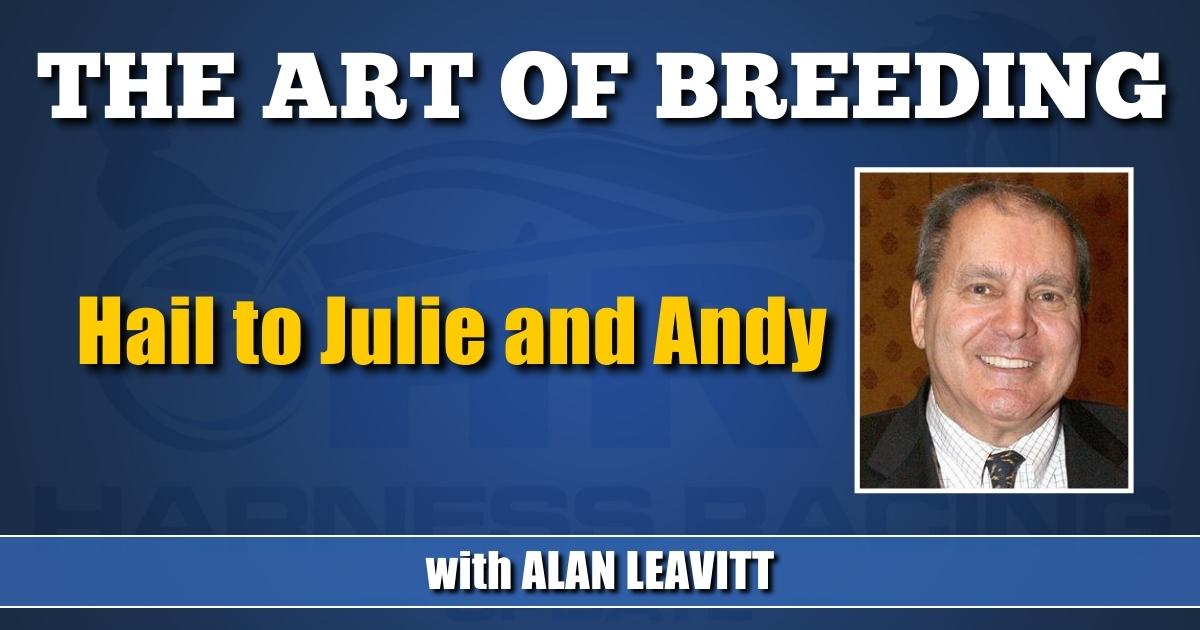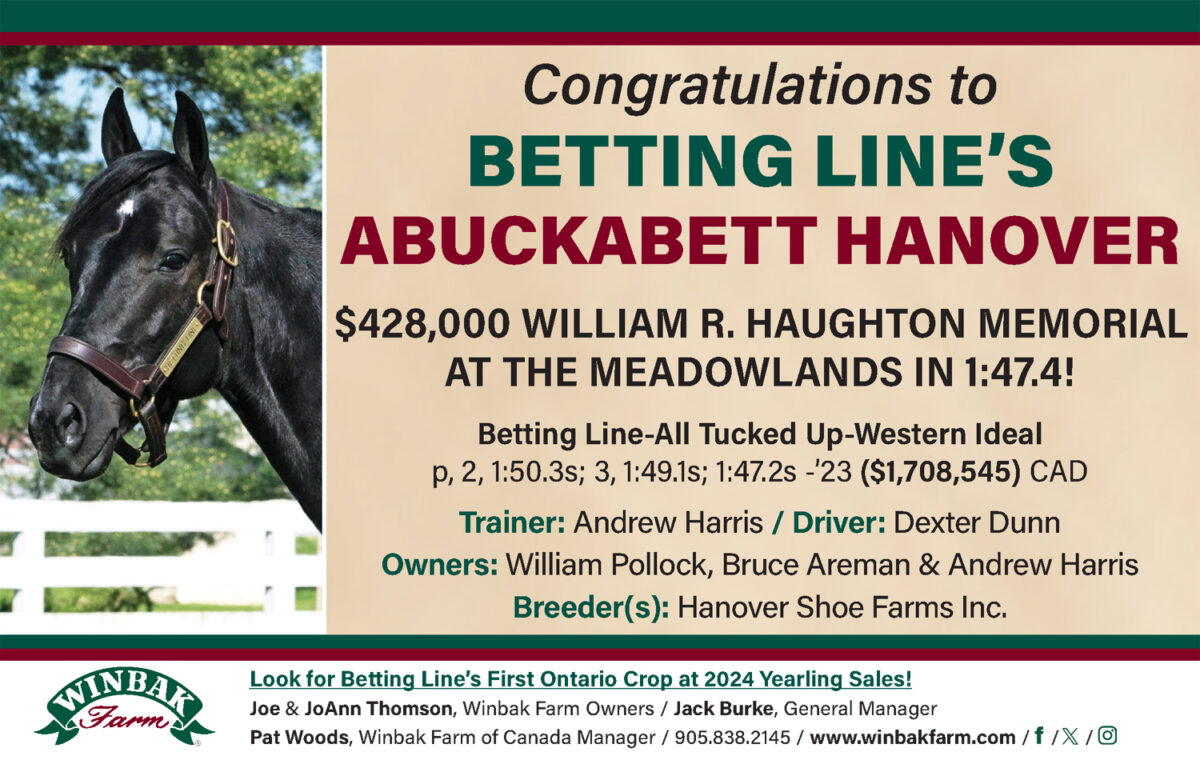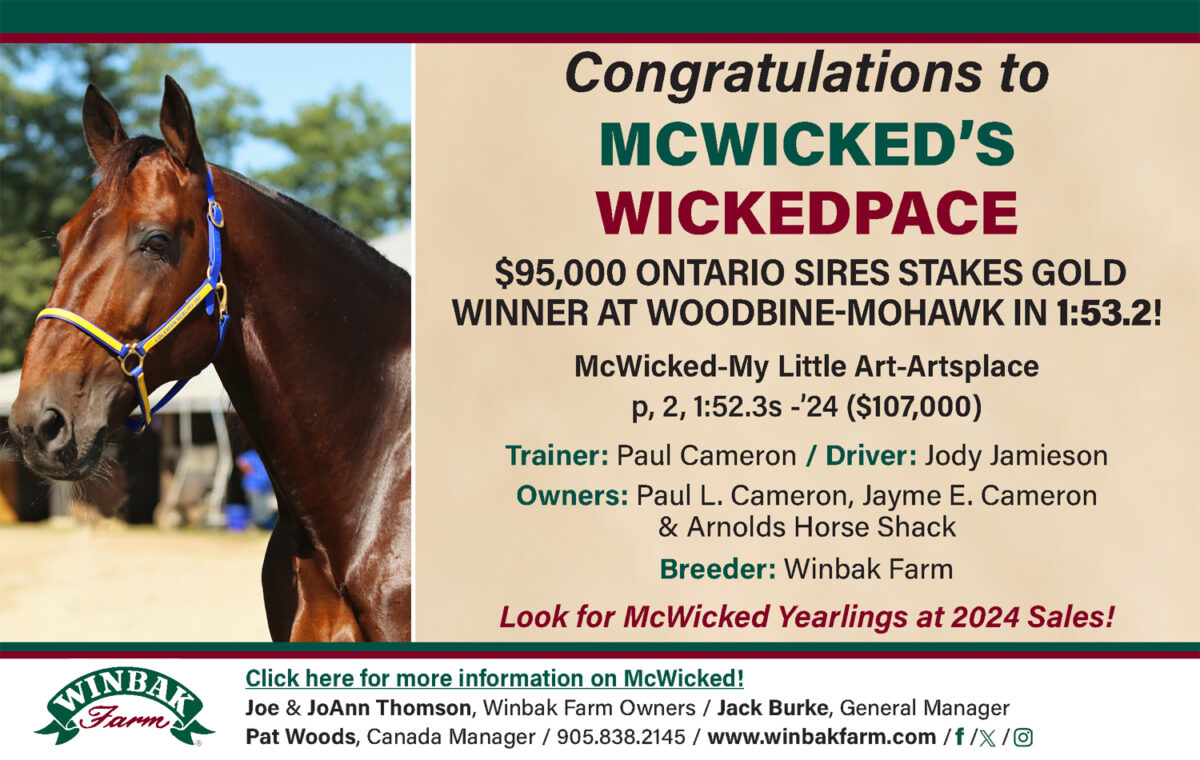

Hail to Julie and Andy
by Alan Leavitt
Because I believe that 2-year-old brilliance is the best indicator of future success as a sire, it’s interesting to look at the results of the $400,000 Kentucky Sire Stakes final for 2-year-old trotting colts, raced last Sunday at the Red Mile.
The winner was French Wine, now with a 2-year-old record of 1:53 and earnings of $358,332, and counting. He’s by Bar Hopping, and out of the slightly salaciously named Creamy Mimi, by Conway Hall. French Wine is trained by the charming Julie Miller, and driven by her husband, Andy Miller, one of the best drivers in our business.
Before I look further into French Wine’s background, it’s worth noting that the greatest thoroughbred breeder of all time, Federico Tesio, also always sought out sires who had raced well at 2. Which, in his day, were not always easy to find, but he looked long and hard in some remote places, and inevitably came up with obscure horses that sired top runners for him.
In our sport, one needs look no harder than Walner to see how 2-year-old excellence translates into a great sire. Walner, who was trained by my old friend Linda Toscano, was only defeated once as a 2-year-old. He didn’t come back at 3, but that was totally irrelevant in evaluating his future sire potential.
Today, Walner is well on his way to becoming the dominant trotting sire, although every year he’ll be challenged by new horses like this year’s first crop sire, Greenshoe. Eventually, in Jim Harrison’s pithy phrase, he could be cannibalized by one or more of his own sons, but that lies well into the future.
But back to French Wine, who is an outstanding two-year-old trotting colt without a speck of Walner in his pedigree. He has no crosses closer than a 4 by 4 cross to American Winner, which, in technical terms makes him linebred to that horse.
As a quick review, if the sum of the two generations is which the same name appears twice is six, or less, that is Inbreeding.
If the sum of those two generations in which the same name appears twice is seven or eight, that is Line Breeding.
If no name appears twice in either of the terms above, the horse so bred is an Outcross.
The vast majority of both our trotters and pacers today are Outcrosses. Which, as I keep saying, into the wind, leaves a huge opportunity for some far-sighted breeder to create a great horse by judicious inbreeding. It also would be a great selling-point for a yearling, at least in this kid’s mind.
There’s another aspect here that smart guys like Adam Bowden have already picked up on. Traditionally, the farms that stand stallions would wait until a stud had finished racing before they went after him to stand at their farms.
I might have been the one to break that mold when I syndicated first Noble Victory, then Speedy Crown and then Speedy Somolli while they were still on the track. It was also the same story when I got my hooks into No Nukes when he was just a 2-year-old.
For my part, if you know what to look for, namely a brilliant 2-year-old racing season, then that’s the time to make your play for the horse.
That was a unique idea that I had all to myself at one time. Now others share it, to their advantage.
Back now to French Wine, who has already told the world that he could well be a top sire. His dam, Creamy Mimi, a name which probably qualifies as a Freudian slip, was a great race filly who earned almost a million dollars on the track.
She’s gone on to be a good producer. Contrary to the norm, French Wine is her ninth foal, where as a rule of thumb, a mare’s stakes horse production is usually gone by her late foals.
Looking at the list of Creamy Mimi’s foals, it’s amusing to note that one of them actually changed nationalities. Swedish Envy morphed into French Laundry after he was sold as a yearling to John Fielding and Christine Takter, even though the horse was also retained by his breeders, Al Libfeld and Marvin Katz.
Creamy Mimi’s fourth dam is Armbro Whirl, a daughter of Catherine Lobell, one of two daughters of Canny Imp that Glen Brown bought from me for Armstrong Brothers. He struck gold with both of them. I bought Canny Imp from R. D. Ricketts in partnership with Bill Rosenberg, the founder of Dunkin Donuts. At one point Rosenberg and I owned more than 70 mares in partnership. Canny Imp was a daughter of the world champion 2-year-old trotting filly, Impish, and today she qualifies as a foundation matron.
Rosenberg wasn’t anybody’s cup of weak tea. One night long ago I was with a party of four on the glass at Yonkers. I happened to notice Rosenberg and a companion being led to a table in the nose bleed zone. Since we had two empty seats, I invited Rosenberg to join us.
The feature race that night was a $25,000 pace, and a horse of Rosenberg’s won it. Some months later, Rosenberg accosted me for “Sticking him with the check that night at Yonkers.”
“But, Bill,” I said, “You had just won $12,500.”
“What’s that got to do with anything?” he shot back.
My dear friend Mario Z has been coaching me in basic Italian, starting with the greeting “Buongiorno.” In my most optimistic moments I want to be prepared to greet someone I’ve always wanted to meet with “Buongiorno, Federico.”














